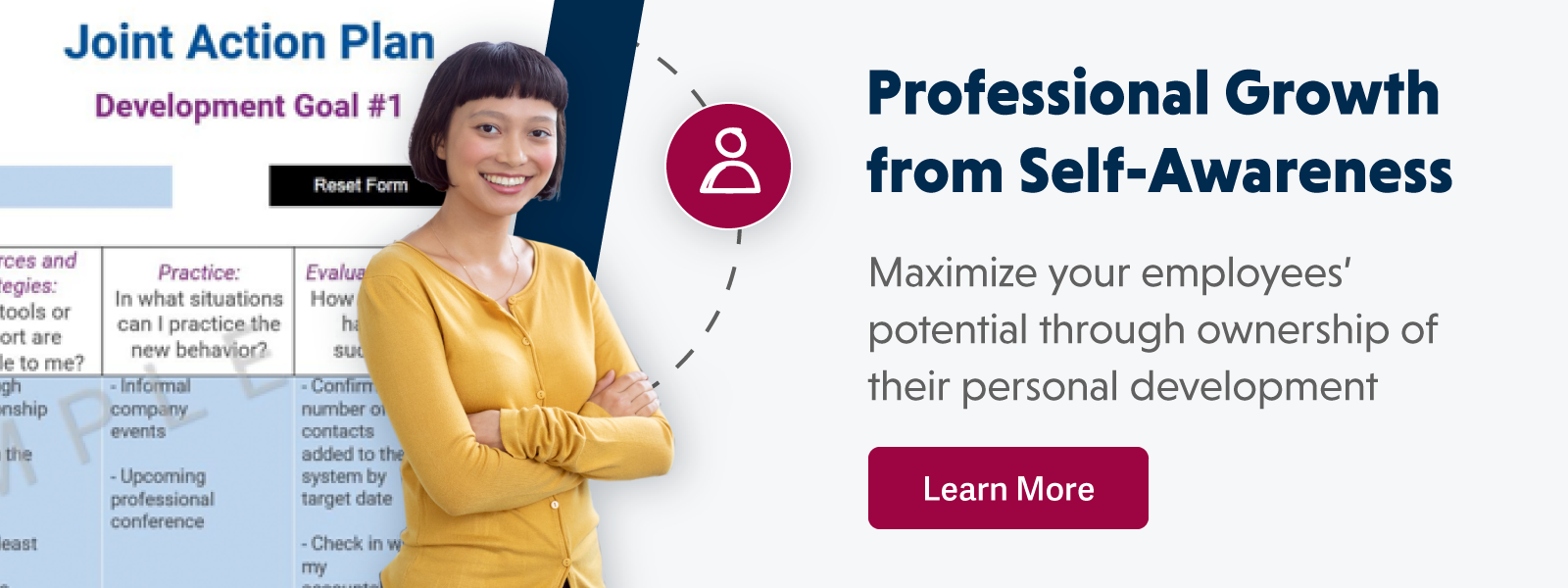This article about performance review tips for managers was originally published in November 2019. It has since been updated as of November 2020.
Employees depend on their supervisors to create a better work culture, motivate them, and coach them throughout their roles. Being an effective manager requires more than just managing tasks — it requires leadership. 72% of job seekers are driven by career advancement opportunities and cite it as the number one reason to change jobs. Simply put, professional development matters, not only for leaders but for all employees.
Professional development and goal-setting play a significant role in successful growth and advancement at any point in a manager’s career. As leaders, managers spend a great deal of time helping employees and teams meet their objectives. However, it can be easy for managers to lose sight of their own goals. It’s time to reflect on what excellent goal setting is and how you can put those plans into action for your managers.
@CaliperCorp breaks down the importance of #ProfessionalDevelopment #goals when it comes to organizational success. Read more: Share on XWhat is a Professional Development Goal?
The success of the company is dependent upon the success of its employees. That’s why it is crucial to encourage your employees, especially your managers, to grow within their role. So, what exactly are professional development goals?
Professional development goals aim to help individuals focus on improving and increasing their competencies through continuous learning and training initiatives throughout the workplace.
Not Sure Where To Start?
Begin by exploring these sources to elevate professional development:
- Formal training seminars
- Online webinars
- Videos
- Coaching
- Mentoring
- Job sharing
During monthly or quarterly performance reviews, sit down with your managers to determine where they need to improve, what skills they wish to acquire or grow, and what these goals will do to improve their overall performance. Each professional development goal can be job-specific, such as cross-training with another department, or more generalized, like leadership participation throughout the organization. When setting goals for your leaders, make sure they are clear, measurable, and realistic. Focusing on these aspects will help your managers achieve these goals and put them into play within their team. When your managers complete specific goals, your entire workforce’s performance will elevate through enhanced communication, productivity, and retention.
Bonus Material: See how Caliper can transform your leadership strategies with Caliper Executive Development and Coaching.
So what key goals can turn your good managers into great leaders? Take a look:
Cross-Functional Learning
Great leaders possess a holistic view of the company. Managers must learn all of the relevant business functions. Having this view helps them maximize their goals and more effectively mentor their employees. By developing yourself cross-functionally, you can identify professional relationships and how to improve upon them.
3 Quick Tips for Grasping Cross-Functional Learning:
- Interact with each department — Take the time to learn their goals and results.
- Learning each department, individual, and team’s needs — Understand the different roles within each function and recognize its impact on the company.
- Understand how each department works together — Determine what each department should be doing and highlight collaboration opportunities.
Communication
Managing a team can be challenging. Obstacles can cause significant miscommunication issues throughout the entire team. A much-overlooked skill among managers is possessing the communication skills to set expectations, share feedback, listen intently, demonstrate empathy, and inspire action or change.
According to an Interact/Harris Poll, communicating well is the one critical skill that 91% of 1,000 employees said their leaders lack. If managers lack the skills to communicate effectively, they create a roadblock for their teams. Ensuring communication is established and thoroughly understood across the board is crucial to being a great leader.
Encouraging a culture for #feedback enables #leaders to gain insight into employee sentiment. @CaliperCorp says #ProfessionalDevelopment goals can help you better engage and retain employees. See how: Share on XSetting a goal to evaluate your current communication techniques and figuring out ways to fill those missing gaps can help your team succeed. Plus, you can help your managers be more effective leaders.
Developing clear channels for communication and building a team that embraces open feedback play a large part in success. After all, you want to promote regular communication and establish the workplace as an environment for public discussion.
When setting this goal, ask your employees for their feedback and learn how communication can improve throughout the organization. Allowing your team to discuss their opinions, challenges, or room for improvement will demonstrate that you’re listening to them. If you aren’t sure how to get the ball rolling, begin by creating a staff survey. Not only do surveys allow your staff to come to you with concerns, but it encourages a culture for feedback.
4 Questions to Ask In Employee Surveys:
- How can I help you to feel more satisfied with your role?
- Do you feel like the management team is transparent? If not, why?
- Do you feel valued at work?
- Are you receiving the proper resources and training to succeed throughout your role?
Using the given information, managers will gain insight into others’ ideas, encourage feedback from staff, use feedback to improve initiatives and create an overall better communication process.
Coaching
With better communication comes better coaching. If a manager wants to become a leader, they must develop the ability to coach others. If managers aren’t skilled at coaching their staff, it’ll be difficult for them to achieve long-term, impactful results for themselves, their teams, and the organization. According to a study by the Society for Human Resource Management, 93% of managers felt they lacked the training and skills needed to properly coach their direct reports.
Ultimately, coaching requires skill and time. Set up managers with mentors so they can gain first-hand experience about the benefits of coaching. They will also gain a valuable adviser on how to coach others. Part of being a great leader is providing each member with insights and tips to help them improve their performance.
Given that their relationship with their manager partly shapes your employee’s experience, managers must have access to the tools to render their management style more helpful with each individual’s needs. To achieve this, on-demand skills and training such as active listening, questioning, building rapport, delivering constructive feedback, and delegation will help managers be honest, transparent, engage employees, and improve workforce performance.
3 Reasons Why Taking A Step Back From Day-to-Day Managing Helps:
- You learn to talk to and respect others.
- You will possess a general understanding of everyone’s roles, responsibilities, and the expectations employees should be setting for themselves.
- You will show how your expertise brings value to the organization.
If you want your team to run like a well-oiled machine, motivation and coaching is a master skill every great leader can acquire. As your managers learn to coach employees through their challenges and identify their strengths, this builds an environment and culture for employees to grow within their career and learn new skills.
Productivity
Everybody loves to be efficient and productive, but managers can quickly get stuck in their day-to-day routine and forget to look for gaps in their process. To have a great leader on your side, you’ll need them to keep up with the latest tech, systems, and procedures to ensure their team is getting the best of the best in order to produce quality work and ramp up productivity, as well as reduce the amount of time spent on unnecessary tasks.
By incorporating management training into your professional development program, you can prepare your leaders for continuous change and improvements to stay ahead of the evolving business world. With this approach to leadership, you will see increased employee retention and overall team productivity growth. Your leaders will evolve, and your team will learn from them.
Every organization is different; your leaders all require their unique professional development action plan to achieve overall team and organizational success. Make sure you collaborate with your team members to identify key objectives or missed opportunities and set professional development goals based upon those objectives. Remember, set goals that are manageable, reasonable, and impactful, not just for your manager but for their team as well.
Interested in how you can help turn your good managers into great leaders? Get the insight and data you need from them to create an impactful professional development program. Work with Caliper to see how the Caliper Essentials for Coaching can turn your managers into great leaders!


